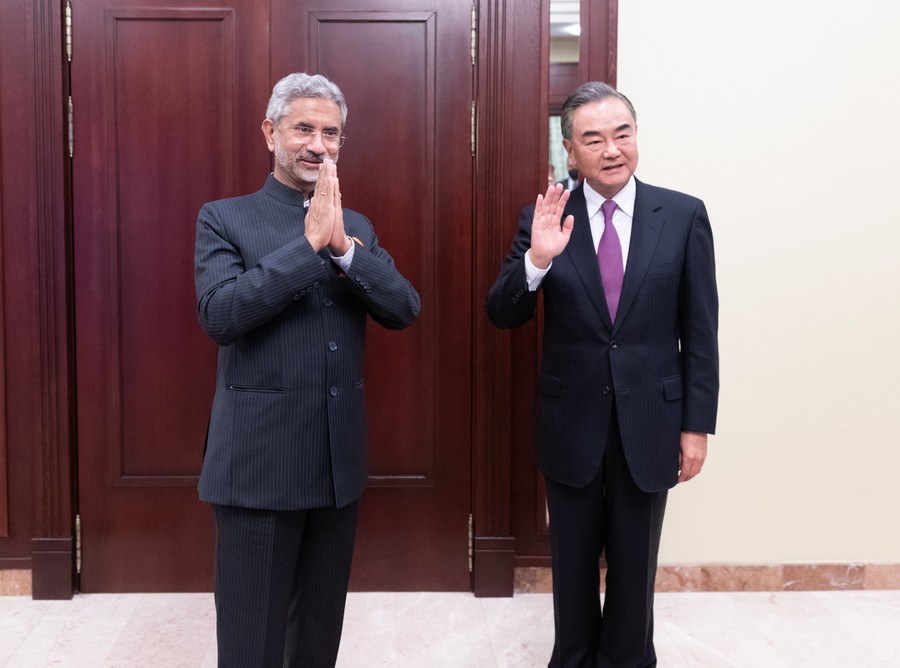
Chinese State Councilor and Foreign Minister Wang Yi (R) meets with Indian External Affairs Minister Subrahmanyam Jaishankar on the sidelines of a meeting of the Shanghai Cooperation Organization Council of Foreign Ministers in Moscow, Russia, on Sept. 10, 2020. (Xinhua/Bai Xueqi)
Wang noted that it is normal for China and India to have differences as two neighboring major countries. What is important is to put these differences in a proper context vis-a-vis bilateral relations.
MOSCOW, Sept. 10 (Xinhua) -- Chinese State Councilor and Foreign Minister Wang Yi held full, in-depth discussion with his Indian counterpart S. Jaishankar on the situation in the border areas as well as bilateral ties here on Thursday.
Wang noted that it is normal for China and India to have differences as two neighboring major countries. What is important is to put these differences in a proper context vis-a-vis bilateral relations.
The key to that is to take guidance from the strategic consensus between the Chinese and Indian leaders that China and India are not competitive rivals or each other's threats, but cooperation partners and each other's developmental opportunities, Wang said in the talks on the sidelines of a foreign ministers' meeting of the Shanghai Cooperation Organization in Moscow.
Wang stressed that as two large developing countries emerging rapidly, what China and India need right now is cooperation, not confrontation; and mutual trust, not suspicion. Whenever the situation gets difficult, it is all the more important to ensure the stability of the overall relationship and preserve mutual trust.
Wang said that China-India relations have once again come to a crossroads. But as long as the two sides keep moving the relationship in the right direction, there will be no difficulty or challenge that can't be overcome.
Wang outlined China's stern position on the situation in the border areas, emphasizing that the imperative is to immediately stop provocations such as firing and other dangerous actions that violate the commitments made by the two sides. It is also important to move back all personnel and equipment that have trespassed. The frontier troops must quickly disengage so that the situation may de-escalate.
The Chinese side is willing to support enhanced dialogue between the frontier troops on both sides to resolve specific issues, Wang said, adding that the Chinese side will stay in touch with the Indian side through diplomatic and military channels and be committed to restoring peace and tranquility in the border areas.
Jaishankar noted that the Indian side does not want tensions to escalate in the border areas. India's policy toward China has not changed. The Indian side believes that China's policy toward India has not changed either.
Jaishankar said that the Indian side does not consider the development of India-China relations to be dependent on the settlement of the boundary question and India does not want to go backwards.
The truth is, India-China relations have made steady progress over the years, and the Chinese and Indian leaders have met several times and reached a series of important consensus on the development of bilateral relations, he said.
The Indian side is prepared to work with China to ease tensions on the border through dialogue and negotiation and to restore and maintain peace and tranquility in the border areas, Jaishankar said.
The two sides reached a five-point consensus regarding the current situation after the discussion. ■



